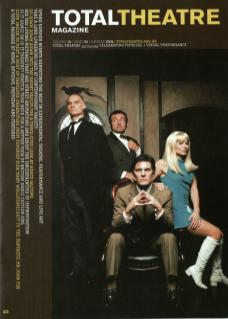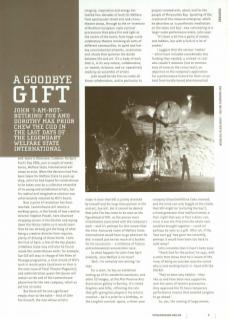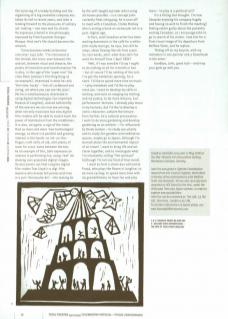On April Fool's Day 2006, just a couple of weeks hence, Welfare State International will cease to exist. When the decision had first been taken for Welfare State to pack up shop, John Fox had hoped for Lanternhouse to be taken over by a collective ensemble of its young and established artists, but his radical and imaginative solution was unfortunately rejected by WSI's board.
Now a point of resolution has been reached. Lanternhouse will remain a working space, in the hands of new creative director Stephen Powell, here observed chopping onions in the kitchen and wiping down the library tables so it would seem that he has already got the hang of what being a creative director here requires: plenty of dirtying of those hands. Come the first of April, a few of the key players in Welfare State may still also be found inside the Lanternhouse walls: for example, Sue Gill will stay in charge of the Rites of Passage programme, a vital strand of WSI's work in recent years (and more on that in the next issue of Total Theatre Magazine), and administration queen Dot Queen will remain at the end of the Lanternhouse phone line for the new company, which as yet has no name.
But there will be one significant empty chair at the table – that of John Fox himself, the man whose artistic integrity, inspiration and energy has fuelled four decades of work for Welfare: from spectacular street arts and circus-theatre shows, through to the reinvention of Northern European-style carnival processions that place fire and light at the centre of the event; from large-scale celebratory theatre involving all sorts of different communities, to quiet and low-key environmental artworks, ceremonies and rituals that question the divide between life and art. It's a body of work that is, in its very nature, collaborative, co-owned, inclusive, and cooperatively made by an ensemble of artists.
John would be the first to credit all those collaborators, and in particular to make it clear that WSI is jointly directed by himself and his long-time partner in life and art, Sue Gill. Yet it cannot be denied that John Fox has come to be seen as the figurehead of WSI, as the person most immediately associated with the company's work – and it's perhaps for this reason that the time-honoured name of Welfare State International would have to go whenever he did: it would just be too much of a burden for his successors – a millstone of history and achievement around their neck.
So what happens for John from April onwards, once Welfare is no more?
‘Well, I'm certainly not retiring,’ he says.
For a start, he has an exhibition coming up of his wonderful woodcuts, and other 2D images, at the Mid-Pennine Arts Association gallery in Burnley. It's called Graphics and Gifts, reflecting the role that gift-giving has played in his artistic creation – be it a print for a birthday, or the Longline carnival-opera, a three-year project created with, about and for the people of Morecambe Bay. Speaking of the creation of this massive enterprise, which he describes as a pantheistic meditation on the lakes and bay, now culminating in a large-scale performance event, John says:
‘It's been a bit like a game of snakes and ladders, but with a fuck of a lot of snakes.’
I suggest that the various 'snakes' – which have included considerably less funding than needed; a snowed-in cast who couldn't rehearse (not to mention tons of snow on the circus tent); an objection to the company's application for a performance licence for their circus tent from locally based pharmaceutical company GlaxoSmithKline (who claimed, and the mind can only boggle at the cheek, that WSI might be 'polluting the bay'); a hired generator that malfunctioned; a first-night that was in fact a dress-run, since it was the first time the whole cast could be brought together – could all perhaps be seen as a gift. After all, if the last ever ‘gig' had gone too smoothly perhaps it would have been too hard to walk away?
John concedes that it hasn't been easy:
'Thank God for the police,' he says, with a smile that shows that he is aware of the irony of being an outsider anarcho-artist who is now working hand-in-hand with the Old Bill.
‘They've been very helpful – they like us and have been very supportive over the years of lantern processions... they approved the 96 hours temporary performance licence that enabled Longline to go ahead.'
So, yes, the running of large events, the servicing of a needy building and the organising of a big ensemble company has taken its toll in recent years, and John is looking forward to the pleasures of solitary art-making – one man and his chisels. He expresses a belief in the philosophy espoused by French painter Georges Braque: that one's life should become the artwork.
'Consciousness needs to become concrete,' says John. 'I'm interested in the liminal; the crossover between life and art, between ritual and theatre; the points of transition and transformation.' He is also, in this age of the 'super real' (he cites Peter Jackson's film King Kong as an example), interested in what he calls the ‘ticky-tacky' – 'bits of cardboard and string, art where you can see the joins'. Yet he is simultaneously interested in using digital technologies (an important feature of Longline), and we talk briefly of the new era we can now see arriving, when not only musicians but also digital film-makers will be able to snatch back the power of distribution from the middlemen. It is also, we agree, a sign of the times that as more and more 'new technologies' emerge, so there is a parallel and growing interest in the hands-on ink-on-the-fingers craft skills of old, with plenty of room for crossovers between the two. As an example of this, John expresses an interest in performing live, using 'real' ink drawing over projected digital images. He also points out that Longline digital film-maker Tom Lloyd is a digi-film maestro who breeds fell ponies and lives in a yurt. 'Vernacular Art' – the making do by the self-taught outsider artist using all means possible – is a concept John currently finds intriguing; he is soon off to meet with a Canadian, Clarke Mackay, who is writing a book on vernacular art in a post-digital age.
In fact, said Canadian writer has been waiting downstairs in the café for a while: John really must go, he says, but still he stays, ideas flowing like ink from a pen. So, last words, John: what does John Fox want for himself from 1 April 2006?
‘Well, if I was sensible I'd say I ought to do nothing at all for a month or two – but of course I'll do nothing of the sort. I've got the exhibition opening, for a start. I'd like to spend more time on music – I play melodeon and I'd like to play more sax. I want to develop my skills in etching, and work on merging my etching and my poetry; to do more lectures, but performance-lectures. I already play music in my lectures, but I'd like to develop a comic character, subvert the lecture form further, be a cultural provocateur. I want to do more gardening and develop gardening as an artform – I'm influenced by Derek Jarman – to study sea-plants and to study Zen gardens and meditative spaces, maybe go to Japan, although I'm worried about the environmental impact of air travel. I want to bring life and art closer together, and to investigate what I'm reluctantly calling the “spiritual" (although I'm not too fond of that word). I want to form a clown duo with Jamie Proud, who plays the Raven in Longline; to do more cycling; to spend more time with my grandchildren; to have fun and play more – to play is a political act!'
It's a fitting last thought. I'm now (despite enjoying his company hugely and having no wish to finish the meeting) feeling rather guilty about the patiently waiting Canadian, so I encourage John to go in search of his visitor. I ask him for a final visual image of his departure from Welfare State, and he replies:
'Riding off on my bicycle, with my melodeon in one pannier and a Powerbook in the other.'
Goodbye, John, good luck – and may your gods go with you.
Graphics and Gifts runs until 12 May 2006 at the Mid-Pennine Arts Association Gallery, Mechanics Institute, Burnley.
John Fox was given a lifetime Contribution Award from Arts Council England, North West in honour of his achievements with Welfare State International. He has also recently been awarded an ACE Grant for the Arts, under the Artist plus Time plus Space scheme, in order to explore new possibilities. John Fox can be contacted at: The Loft, 53 The Gil, Ulverston, Cumbria LAI2 7BL. For further information on future plans, see www.foxandgilobtinternet.com


